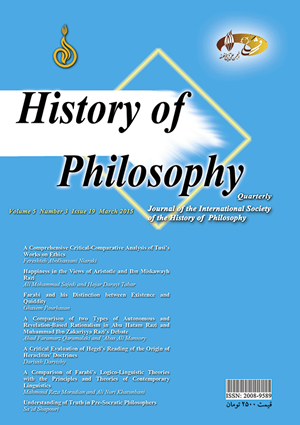-
-
List of Articles
-
Open Access Article
1 - A Comprehensive Critical-Comparative Analysis of Tusi’s Works on Ethics
Fereshteh Abolhassani Niaraki -
Open Access Article
2 - Happiness in the Views of Aristotle and Ibn Miskawayh Razi
Ali Mohammad Sajedi Hajar Darayitabar -
Open Access Article
3 - Farabi and his Distinction between Existence and Quiddity
Ghasem Purhassan -
Open Access Article
4 - سخن سردبير
Hossein Kalbasi Ashtari -
Open Access Article
5 - A Comparison of two Types of Autonomous and Revelation-Based Rationalism in Abu Hatam Razi and Muhammad Ibn Zakariyya Razi’s Debate
Ahad Faramarz Qaramaleki ‘Abas Ali Mansory -
Open Access Article
6 - A Critical Evaluation of Hegel’s Reading of the Origin of Heraclitus’ Doctrines
Dariush Darvishy -
Open Access Article
7 - A Comparison of Farabi’s Logico-Linguistic Theories with the Principles and Theories of Contemporary Linguistics
Mahmoud Reza Moradian -
Open Access Article
8 - Understanding of Truth in Pre-Socratic Philosophers
Sa‘id Shapouri
-
The rights to this website are owned by the Raimag Press Management System.
Copyright © 2017-2026







